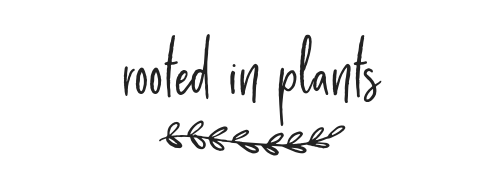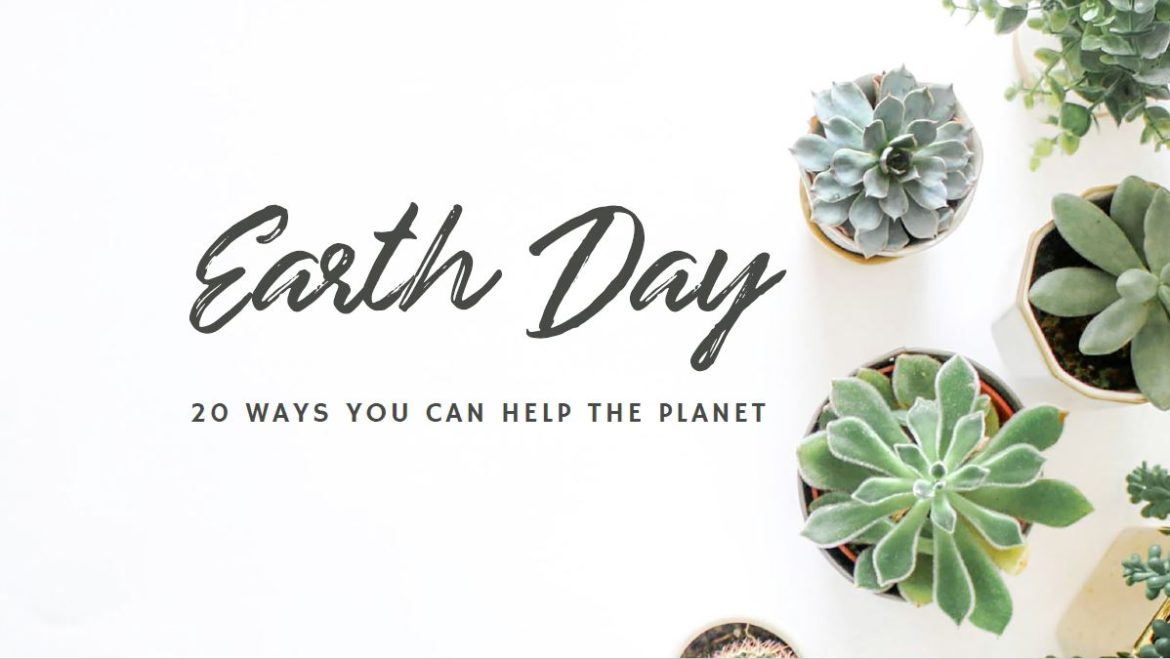Happy Earth Day!!! While every day is Earth Day in my book, I think it’s important that we have a day where the world comes together to appreciate this beautiful planet of ours and reflect on ways we can all do better. After all, Earth is the only home we have; there is no “Planet B” so it is imperative that we all do our part to mitigate climate change. There are so many small actions we can take to help lower our carbon footprint and benefit the environment.
For Earth Day, I compiled a list of 20 ways we all can help the environment. Some of these are probably ones you have heard over and over again while other items may be new to you. Whatever the case may be, I hope that you can draw some inspiration from this list and implement some of these habits into your life. A lot of them are simple changes you can make while others may take more effort and habit changes but they will be worth it.
- Eat less meat and animal products. Animal agriculture is the second largest contributor to greenhouse gas emission and is one of the leading causes of deforestation, biodiversity loss, and water pollution. While I would love for more people to adopt a vegan diet, just reducing the amount of meat you eat is beneficial to the environment and will help lower your carbon footprint.
- Use a reusable water bottle. Staying hydrated shouldn’t come at the expense of our planet. Bottled water is essentially tap water that companies have packaged into plastic. If you are fortunate enough to have safe drinking water in your home, why not save money on bottled water and just fill up a reusable bottle with water from your tap.
- For you coffee drinkers out there, invest in a reusable coffee cup. I’m not a coffee drinker myself but I do know that a lot of coffee places let you use your own coffee cup in lieu of a paper or plastic cup.
- Bring your own reusable grocery bags when you go shopping. It doesn’t make much sense to use a plastic bag that isn’t going to decompose for hundreds of years just to carry your groceries from the store to your car and then from your car into your home, does it? Invest in two or three large, durable grocery bags and use them every time you go shopping. A tip to not forget them: as soon as you are done unloading your groceries, put your bags back in your car.
- Bring your own utensils when you go out to eat. You don’t even have to buy a set of bamboo utensils like the ones you see all over Instagram. You can use utensils you already have at home and just wrap them in a napkin or keep them in a pouch to take with you on the go.
- Bring your own lunch to work/school. Avoid packaging waste from fast food restaurants or vending machines by packing your own lunch. This is not only good for the planet but good for your health and your wallet, too.
- Start composting. A lot of people think that food scraps will decompose in a landfill the same way they would in a compost pile but that is not true. When in a landfill, food scraps produce methane gas whereas, in a compost pile, they will produce carbon dioxide and fertilizer (you can read more about this here). If you have space in your backyard, start a compost pile to put your food scraps and yard trimmings in. If you live in an apartment, you can buy a small compost bin that can fit in a cabinet in your kitchen or you can store your food scraps in a bag in your freezer and take it to a community compost site once a week if this is available in your city.
- Start a garden and grow some of your own food. Growing your own food is good for the environment and rewarding for you because you get to enjoy the fruits, and vegetables, of your labor. If you live in an apartment, this could be hard to do but you might have some space for a few herb plants. I’ve been wanting to start a garden in my own backyard for a while now and have been trying to convince my parents because I have always loved the idea of growing my own food.
- Pick produce that comes naked (i.e., not wrapped in plastic). It’s become common for grocery stores to sell produce wrapped in plastic which is very unnecessary. Try to buy produce that comes as is.
- Shop and eat local. You can support your local farmers by shopping at farmers markets and eat at restaurants that buy local produce. You can also support artists in your community by buying their art, jewelry, clothing, etc.
- Pick up trash in your community. Go to your local park or beach and pick up litter. You can even walk around your neighborhood and pick up trash. I don’t really understand why people litter but, unfortunately, it is all too prevalent.
- Walk, bike, or carpool to work/school. This might not be possible for everyone depending on how far you live from your job/school as well as the weather where you live but it’s definitely something to consider. I personally don’t live close enough to my office that I could walk or bike to work but I do work at the same company as my dad and we ride together to work.
- Buy less stuff. In our society, we are encouraged to buy more and more things and, a lot of times, we buy things we don’t really need. Before buying something, ask yourself, “Do I really need this item?” If the answer is no, then don’t buy it. If the answer is yes, see about purchasing a sustainable version of whatever it is you need.
- Buy from ethical, sustainable clothing brands when purchasing new clothes. Did you know that the fashion industry is the second largest polluter in the world? (you can read more about this here) Consider supporting slower fashion brands that use natural fibers and dyes. If you want to learn more, a YouTube channel I love that covers sustainable fashion is My Green Closet.
- Shop second hand and/or swap clothes with friends. In the US, more than 11 million tons of textile waste is generated each year. This equates to about 82 pounds of textile waste per person. To reduce the amount of clothing going into landfills, it’s beneficial to buy second-hand clothes and participate in clothing swaps with friends. I personally have not thrifted any clothes yet because I haven’t found a good thrift store in my area but it is something I am open to and hope to do in the future.
- Wear reef safe sunscreen. Many sunscreens contain harmful chemicals, such as oxybenzone, octinoxate, and triclosan. These chemicals are harmful to marine life and coral reefs. Consider purchasing sunscreen that is mineral based and reef safe. You can read more about this topic here.
- Use a bamboo toothbrush. It is estimated that over a billion plastic toothbrushes end up in landfills every year. A simple solution is a bamboo toothbrush that biodegrades within a few months or years depending on how it is composted, unlike a plastic toothbrush that can take up to 1000 years to decompose.
- Use natural household cleaning products. Instead of using harsh cleaners that are laden with harmful chemicals, opt for natural cleaners such as vinegar, castille soap, baking powder, and essential oils. These options work just as well as the hard stuff and are better for the environment and your health.
- Use less paper. Avoid printing unnecessary paper at home and at work. You can also waste less by unsubscribing from junk mail and going paperless with your bills.
- Watch environmental and nature documentaries. I believe that it is important to have an admiration and appreciation for the planet we live on and to educate ourselves on the issues we are facing. Watching documentaries is a great way to do this. Some documentaries I recommend watching are Cowspiracy, A Plastic Ocean, Chasing Coral, and Our Planet.
I hope you have had a lovely Earth Day celebrating the beauty and wonder of our planet. What are some ways in which you already help the environment or actions you plan on taking to be a better steward of our planet?

